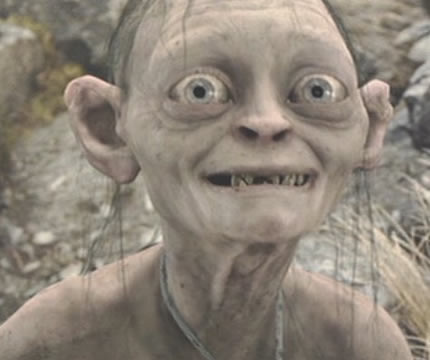Yesterday, I wrote about Karma and how the idea of Nemesis must exist, internally at least. Later, one comment on the blogpost really grabbed my attention. A friend wrote that once someone does evil, and does it again, the internal guilt eases until the dark deeds are seen as "normal" by that person.
She's right, and it erases my neat metaphor of an interior angry goddess. However, I do wonder about the dreams of the people who live with dark deeds, as well as their lives. If someone is truly evil, truly in the dark side - can anything be satisfactory? Love, life, family, relationships? Do they have friends?
Oh, the fascination of villains.
My sister, whose intellect I greatly admire, once told me that in her opinion a great book offers redemption for the villain. As an example, in the Lord of the Rings trilogy, Gollum (that strange, brilliant character) is redeemed by one act at the very end, thus saving Frodo from soulless eternity.
Another example is Snape, although that dude is seriously complex. I wonder as an author, if he developed himself on the page, or if JK suddenly had one of the concept flashes, the kind that hit just as you get into bed and you haven't any paper handy. (Although, of course, he isn't a villain at all.)
Redemption for the villain ... it's a tricky concept. It has to be organic and come from within (thus bypassing the interior angry goddess) or from a series of events that evolve naturally, like a Bach concerto or the inside of a seashell. The writer has to seriously Fibonacci sequence it.
If redemption is handed out with a Deus ex Machina fanfare, the gloriously evil villain is compressed into a cardboard cutout. No, redemption itself must come, like karma, from within.
A final word on villains - as I was writing this post, my sister and some of our friends from high school were facebook chatting about a murderer.
The murderer didn't seem to be evil, so much as STUPID. Her act of violence and terror came from being so dumb that she couldn't comprehend that it would change her life (and, most sad of all, the lives of her kids) forever.
That is real life, not fiction, and it brings me back to the concept of karma. Probably that sad little murderer will never even understand the depths of what she has done. But will she ever feel soaring happiness of motherhood, the solid comfort of an enduring marriage, or the quiet triumphs that come with ordinary life?
Of course, all of that is pretty impossible behind bars. But the prison I wonder about is the one in her own mind.

